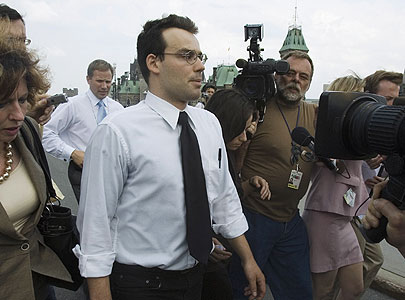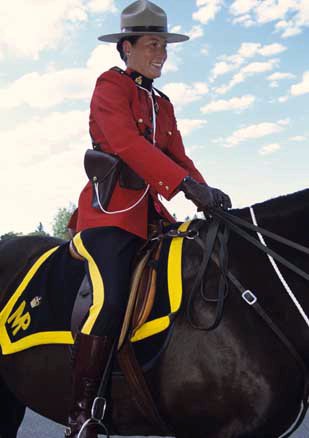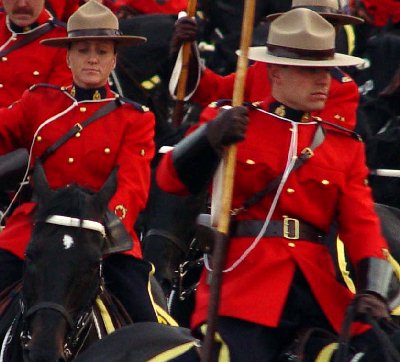RCMP Arrest Activist The Canada eZine
Canada's RCMP resorts to Gestapo Tactics to Scare Dissenter OTTAWA The man arrested for allegedly leaking the Conservative government's environmental plan was a temporary employee, a self-described activist and drummer in a punk band that sings an angry screed against the Prime Minister and the "rise of the right." The website for the band, the Suicide Pilots, depicts an airplane flying into the Peace Tower on Parliament Hill. Those are just a few of the details that emerged yesterday about Jeffrey Monaghan, 27, who was taken away from his Environment Canada workplace in handcuffs Wednesday morning by two RCMP officers. He is under investigation for potential breach of trust, an offence that could land him five years in prison, but has not been charged with any crime. Monaghan said he has been working with the federal government for the last four years, employed through a local human resources firm. For his job at Environment Canada's offices in Gatineau, Que., he began at 5 o'clock each morning and read about 48 newspapers a day to summarize daily coverage. He also managed the department's internal communications website. He said that in his job he was the "lowest ranking temp employee in the department, possibly the entire government." It is unclear how he could have come into contact with a secret draft of the document. At a news conference yesterday, Monaghan, his voice shaky and nervous, launched into a diatribe against the Tory government's public relations strategies. He also spoke in favour of decisive and immediate action on the environment, leaving little doubt where his sympathies lie in the matter even if he is cleared of any wrongdoing. "I have not been charged with a crime," he said. "What I can tell you is that the proposed charges against me pose a profound threat to the public interest. "They are without precedent in their disproportionality, they are vengeful, and they are an extension of a government-wide communications strategy pinned on secrecy, intimidation and centralization." The police investigation is looking into who sent a copy of Environment Minister John Baird's climate change plan to some media outlets and to environmental organizations on April 16, one week before the government was to release it publicly. Environmentalists said the document was faxed to them from a machine that they were able to identify as belonging to a Staples business centre. They also received an email version of the document from what they said was a generic Staples email address. Along with the leaked documents was a sort of manifesto from the source of the leak, saying that it was an act of protest against the "secrecy of the Harper government, its continuous PR campaign and the abandonment of international standards for (greenhouse gas reductions)." The source added that the action was taken out of a feeling that the need for public information outweighed the importance of "due process." The leak is unrelated to an incident that occurred a week later when a copy of a Baird speech on parts of the environment plan was accidentally faxed to the Liberal opposition. Yesterday, Monaghan said the leak that police are investigating is the "first explicit document" the Tories have presented to state that the government will not meet its obligations under the Kyoto accord. He said the Conservatives were "disguising" what they were doing by using Kyoto's 1990 benchmark for emissions reductions with a much easier 2006 benchmark. Canada's emissions have risen 35 per cent between 1990 and 2005. "That is not due process," Monaghan said. Monaghan was joined at the Parliament Hill news conference by two people identified only as his best friend and his girlfriend. He wore black jeans, a white shirt, black tie and black canvas running shoes as he addressed the television cameras and delivered a brief statement, taking no questions on the advice of his lawyer. Monaghan has been involved in various causes at Carleton University he hosted a weekly radio show, and was co-organizer of an activist bookshop in downtown Ottawa. The Suicide Pilots, the four-piece punk band where Monaghan is known as "Bones," sings about the rise of the right-wing and the rich in a song called "Harper Youth" that compares Prime Minister Stephen Harper to Adolf Hitler. "Give me your fear, give me your hate, give me your intolerance and I'll give you a place in the Harper Youth," goes the song. The Suicide Pilots also provide a link on their website to Earth First, a radical environmental group founded in 1979 that endorses a "front-line, direct action approach to protecting wilderness," according to the group's website. "We believe in using all the tools in the tool box, ranging from grassroots organizing and involvement in the legal process to civil disobedience and monkey-wrenching." Opposition politicians were quick to line up on the side of the young radical yesterday. Liberal Leader St้phane Dion said that while he has "no sympathy at all for leaks," he was uncomfortable with the RCMP's handling of the matter. "It looks like an attempt of intimidation and this is going very, very far, very, very far," he said. "It doesn't look good. It looks quite ugly." RCMP Sgt. Monique Beauchamp said yesterday that while officers have "some leeway" in how they carry out an arrest, handcuffing a suspect is "standard procedure." She added that Monaghan was "very co-operative" when he was arrested.
Cover-up culture rife in RCMP, committee told
OTTAWA - The RCMP has a culture of covering up corrupt behaviour and abuse of power that contributed to the kind of wrongdoing involved in the scandal over the Mountie pension fund, nepotism and alleged sweetheart contracts to friends, a serving officer and the force's former ethics advisor say. An officer with 31 years service who served as a representative of RCMP rank and file in the force's internal staff association was so concerned yesterday about possible retaliation that he asked a Commons committee investigating the pension affair to assure him of legal protection following his testimony. Staff Sergeant Andre Girard, who claimed his career suffered after he attempted to obtain copies of an investigation into possible wrongdoing with the pension fund, said RCMP divisional staff representatives deal with internal harassment on a broad scale. "They know about the harassment going on, they know about the sexual harassment going on, they know about the coverups going on in the field and they are scared to come forward," Staff Sgt. Girard said. "There is always a certain degree of frightness, if I should say so, to come forward, to step forward and to express ourselves freely, even in this democracy, especially in a paramilitary organization such as the RCMP." Staff Sgt. Girard shocked MPs when he said a major problem he faced as a staff representative was "institutional protectionism, anything to protect the image of the organization, sometimes at all costs ?" Under questioning, Staff Sgt. Girard alleged that RCMP officers learn to cover up mistakes from the moment they join the force. "That is one thing that you are taught from training ? that's what I learned in training, to cover yourself always, the more you advance in this organization, you see a lot of things going on, you see members protecting themselves," he told the committee. A former RCMP assistant commissioner who served as the force's ethics advisor and was present at the committee hearing yesterday confirmed Staff Sgt. Girard's view of the internal RCMP culture. "I would agree," the retired officer, John Spice, told NDP MP David Christopherson. "During my tenure as ethics advisor I dealt primarily with bad behaviour and I was working probably 12 and 14 hours a day and sometimes on weekends." "We should have had zero tolerance for all sorts of unethical behaviour and quite frankly as much as I would like to say that we tried, we failed miserably," he said. The two officers spoke after a top Mountie denied allegations during earlier testimony in the inquiry that he interfered with the processing of an Access to Information Request over an investigation into the pension-fund wrongdoing or that he had kept records of improper or illegal requests former RCMP Commissioner Giuliano Zaccardelli had given him. Deputy Commissioner Paul Gauvin said he had been asked for his opinion about the release of documents that mentioned him only as a routine process under privacy provisions. Another retired officer, Pierre Lavoie, also challenged earlier claims, saying he did not delay the release of documents about an Ottawa police investigation into the pension fund and instead contributed to their eventual release by confronting other officers. Mr. Spice praised the determination of RCMP officers and a civilian employee whose determination to expose wrongdoing in the pension fund led to an internal audit, an investigation by Auditor General Sheila Fraser and the committee inquiry.
|
What's Wrong with the RCMP? |
|
Warnings not passed to RCMP headquarters: Air India probe
The RCMP unit responsible for co-ordinating airport security often wasn't tipped about threats and warnings that preceded the 1985 Air India bombing, the inquiry into the disaster heard Monday in Ottawa. Former sergeant Joe MacDonald, who ran the airport policing branch at RCMP headquarters at the time, testified before the inquiry, which is looking into the investigation into the bombings that killed 329 people on Air India Flight 182 as it was en route from Canada to India on June 23, 1985. MacDonald was questioned at length by commission lawyer Anil Kapoor, who reviewed a series of memorandums and Telexes sent at the time among various government and security agencies, including CSIS and the Department of Foreign Affairs, then called External Affairs. MacDonald said he was surprised he didn't receive some of the documents, which included warnings of potential hijackings, airline bombings and suicide attacks. One, dated August 1984, warned that Sikh extremists planned to blow up a Boeing plane leaving Montreal and London, England. MacDonald said he believes he should have received it, but never saw the warning, which was sent to other RCMP branches and CSIS. "A certain amount of stuff was left to discretion," said MacDonald. MacDonald, whose department only included two people at the time, was responsible for setting security levels at airports and monitoring RCMP branches at Canadian airports. MacDonald said he didn't leave his office in Ottawa to do the job, instead relying on feedback from the local branches. He also told the inquiry that, for the entire month of June in 1985, Air India had Level 4 security the second-highest level possible at Toronto's Pearson Airport, where the flight originated. Such a level requires heightened security, including constant watch of passenger screening and the use of an explosives-sniffing dog. After MacDonald finished his testimony, the inquiry heard from R.E. Muir, who ran the RCMP's VIP protection branch from 1977-1986. He said sometimes intelligence documents were literally "walked down the hall" from one RCMP branch to another. "We shared with airport security if there was a perceived need," Muir said. "The desk officer would just walk down the hall. If it didn't, I'd be very concerned and surprised." Headed by retired Supreme Court justice John Major, the inquiry resumed two weeks ago with a focus on whether police, intelligence officers and airport security officials did all they could to head off the tragedy. More former RCMP officers are expected to testify on Tuesday and Wednesday. The inquiry was called because the Air India investigation and prosecution was the costliest and one of the longest in Canadian history yet led to no murder convictions. Investigators believe the bomb plot and a related one that killed two baggage handlers at a Tokyo airport was carried out by extremists who wanted India to create an independent Sikh homeland. Only one person was ever convicted in the plot. Inderjit Singh Reyat pleaded guilty to manslaughter in 2003 and received a five-year sentence. The suspected ringleader, Talwinder Singh Parmar, died in India in 1992 and the RCMP's two main surviving suspects were both acquitted in March 2005, after a 19-month trial.
| |


